Campeones... Campeones... Oé!, oé!, oé!
Yes, Spain won the Euro2008 yesterday. I am no football fan, but I like justice and (I heard that) Spain played very well during the whole thing, and that she deserved to win. Good so.
I would like to remark three facts that I observed:
(i) two very different concepts are usually mixed up outside Spain: Olé is a salute that the public does on a bullfight when the torero makes a beautiful figure. The howl to cheer for your team is NOT Olé!, olé!, olé!, but Oé!, oé!, oé!, without "l".
(ii) it is interesting how a success of the national team is automatically transferred to all nationals of the winning country. Even though I did absolutely nothing, I have been ten times complimented on the Spanish triumph. Winners are popular.
(iii) even more interestingly, Austrians seem to be really happy with the result of the match yesterday. But I guess it's not only because of a special sympathy they have for Spain, but also, on the negative, because of who did Spain beat. I guess a certain Schadenfreude (today's favourite word) was behind the horn concert yesterday... ;)
Monday, 30 June 2008
Schadenfreude
Sunday, 29 June 2008
Hellbrunn's freeloader
This country is so perfectly beautiful that it doesn't seem real. But, if you pay attention, there are some spoungers as well:
Let's go see how the Spaniards do today. To the other side, to the neighbour country. No risk, no fun... ;)
Thursday, 26 June 2008
Two pounds of reality, please!
One of the words that surprises me the most here is Realitätenbüro (lit. "realities office").
Even though the dictionary suggests it's the southern (*) word for a real estate agency, I think it's much more fun to imagine people going to a Realitätenbüro to learn to big truths about life, the realities, for example:
- money does not bring happiness, or
- Santa Claus is a green gnome, the red fat one was created by a renowned soft drink company.
Interesting, isn't it?
(*) at least, Mr. Google does not seem to find any Realitätenbüro north of Munich
Wednesday, 25 June 2008
Vecchi porti
There are places in the world where peace of mind is easily achieved. Places where the sea embraces tenderly the people that settled at her shores centuries ago. Aged cities. Old harbours. Wise people.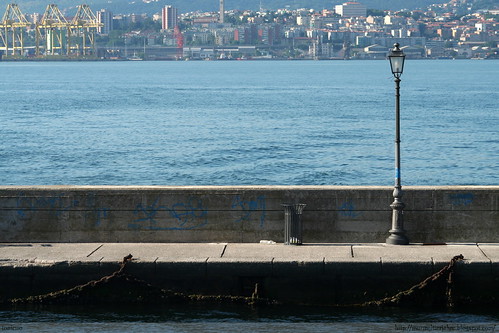
Cities, like Trieste, where I feel like I were home, even though, until this last weekend, I had never been there before. Towns, like Muggia, that lull me gently, in a way I never felt up North, in Central Europe.
Aged buildings, shabby walls, familiar people, broken windows, laundry, narrow alleys, street lamps, all those things that you miss when you are living in CandyLand, where you still look for the stage machinery behind the scenes...
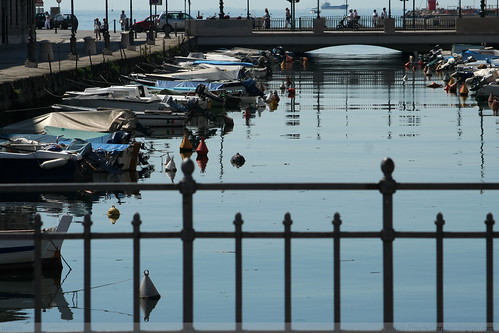
The charm of towns and cities of a modest past, whose History does not include great wealth that would have allowed frequent reconstruction of its buildings, but left their loveliness untouched and let them keep a genuineness that the others, those keeping up with the last architectural tendencies, lost long ago.
And of course the Mediterranean, which welcomes us once again, this time with a new face, but always the same, always the one whose water caressed my skin so often. The sea and all her rig that are, without any extra effort, main characters of the best pictures in the world.

By the way, I found those ears again...
Sunday, 15 June 2008
Euro-impressions
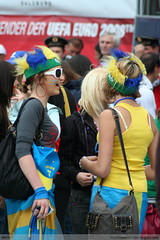
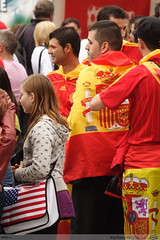
How ya' doing? ;)
Don't you feel much safer now?
Swedish hats...

...and Russian and Greek ones!
What is that on his head?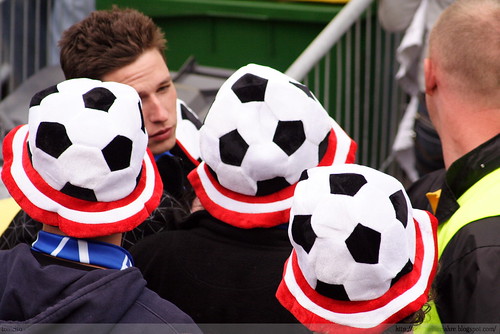
Going in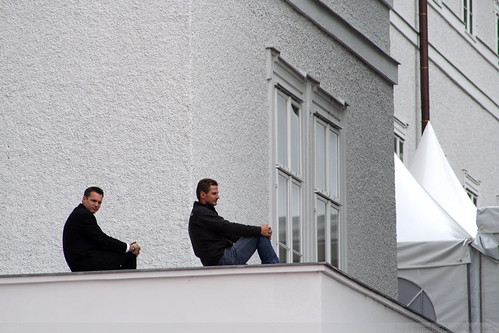
Looking down
I swear it's the last time I bring granny to the fan zone!
I wasn't the only one...
About gravity and time perception
Thanks to the internet, we can meet much more people today than we could if it would not exist. Meet them, take a brief look at their lives or follow their thoughts with interest. Anyway, for those who always felt a little geeky, those who wouldn't play football at school, those who rather kept quiet when the teacher asked something, for all of us, the internet makes us aware of our comforting averageness, after taking a look out there...
I've always liked to make up theories about why things are the way they are. Most of them are nothing but pure crap, but some of them, the oldest ones, achieved to me a status, maybe not of irrefutable truths, but at least theses for which a counter-example is yet to be found.
One of my favourites is the subjective perception of time, and how Newton mechanics comes in hand to explain it. Some time ago, it was remarked how spring and summer go away too fast. If we imagine the year as a circle, divided more or less uniformly in 12 sectors, corresponding to the 12 months, if we assume December and January at the top, we put it upright and we imagine time going by as a little ball rolling on it under gravity's action, it is then easy to understand why spring goes away so fast (the ball falls almost free from April on), why does summer, too (with all the drive from spring, September is already there before we can realise it), why is it so hard to pass from October to January (going uphill!), and why we start feeling more perked up from March on (gravity starts to pull us down).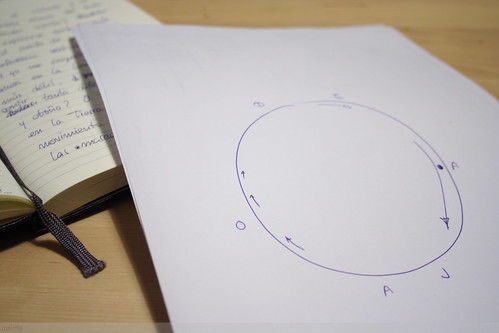
Other time intervals can be explained with this approach as well: working hours (uphill from 8:00 to 12:00, downhill from 13:00 to 17:00, although sometimes the whole thing turns upside down, I don't really know why...) or the week (Saturday and Sunday at the bottom, Wednesday on top).
And I wonder, if we were on the Moon, where gravity is weaker, would we feel less difference between spring and autumn? Or, if we stayed on Earth, is the ball's movement affected by tides?
Friday, 6 June 2008
Sunday, 1 June 2008
Waiting for the rain
The Mediterranean coastline is a hard piece of ground.
One of the first things that strucks the Mediterranean expatriate on arriving to Austria is the greenness, that incredibly saturated green colour, almost supernatural, whose brightness hurts those eyes that grew accustomed to red ochre ridges, yellow brooms, infinite blue sea and dusty green olive trees.
Soon after moving to Austria one realizes where does the green come from: flora has a rather easy life on this land because it rains often and abundantly. That's why trees can turn into 30 and 40 meter tall giants. That's why going into the woods outside paths is almost mission impossible in spring and summer, save you have a machete.
The Mediterranean coastline, I was saying, is a hard piece of ground. Because rain is there a really scarce good that, when it falls, does so in a short and wild way over a very dry ground that cannot soak it up and ends up causing floods instead of producing crops.

But Mediterranean vegetation, as are its people, is old and wise and learned to wait, keeping all their energies for that couple raindrops that are going to fall, if not today, maybe tomorrow, or next week, or next month. And when those raindrops do eventually fall, they get strength out of nowhere, throwing roots to drink them, sprouting little shoots that will let them continue saving that light, that Sun, saving energy for the next drought.

I think Mediterranean vegetation is fascinating because of the way it holds on anxiously to life and carries on in spite of a rather hostile environment. I love it because it reminds me of its people, it reminds me of my people, who turned barren into cultivated land with sweat, blood, effort and resolution, under the remorseless Sun that burns everything out.
Last week we have been to Catalonia. As we came back, my office colleagues asked me, as usual, if we'd had nice weather. And I told them yes, it'd rained every day and that's the best weather we could have wished for. I'm not sure that they really understood my smile and the joy I felt in my heart as I saw my land green and alive.

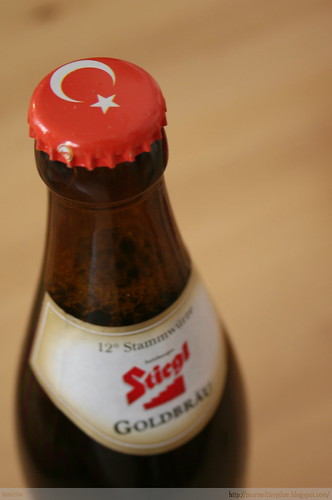
 versión en español
versión en español






